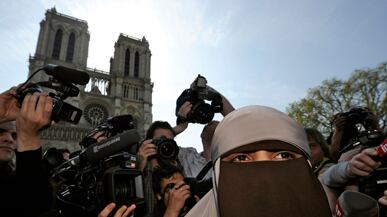The last time I saw Muslim women in the middle of Paris wearing full-face veils was a couple of years ago. They were going into Prada. Specifically, they were going into the store that’s across the street from President Nicolas Sarkozy’s official residence on the Rue du Faubourg Saint-Honoré and right next door to the interior ministry, which is in charge of the police. Judging from their body language, I didn’t get the impression the women were too worried, even though the great debate about banning this vaguely ninja-like attire had already begun.

The wildly unpopular Sarkozy started pushing the idea of a “ ban on the burqa” back in 2009 to try to win support from voters scared that Muslim culture is encroaching on their own. But nobody said boo to these ladies in black browsing in Prada, of course. They were tourists visiting from one of the Arab Gulf states. They’d arrived in a stretch Mercedes, departed the same way, and no doubt had their packages of glistening skirts and vertiginous high heels delivered to the privacy of their five-star suites. They’re the kind of customers that France’s purveyors of luxury are always happy to see in their stores, even when they can’t see their faces.
Since Monday, when the French ban against wearing such a veil in public went into effect, these women might face a fine upward of $200 for hiding their faces. If prosecutors could prove that someone else—a husband, father, brother, mother, imam or whoever—forced them to dress like that, then that person could be hit by a $44,000 fine and jail time.
The whole issue has about it an air of unreality. There are certainly a great many more Muslim women in France who wear bikinis than wear burqas.
But, in the real world, that’s not going to happen. The rich Arab women from the Gulf who wear the niqab or “burqa,” as the full veil is sometimes called, will simply find other countries where they can shop. The less affluent who actually live in France—fewer than 2,000 by the interior ministry’s count—don’t show up much in the middle of Paris anyway. (The two arrested in front of Notre Dame Cathedral over the weekend were accused of protesting without a permit, not veiling without consent.) And in those largely immigrant neighborhoods on the outskirts of French cities where you will see an occasional niqab on the street, the cops have enough trouble keeping order without harassing the womenfolk. The France Police union called the whole law “an enormous procedure for an absurd result.” As its secretary general, Michel Thooris, told Le Monde, “you’re not going to fight against religious extremism with a ticket.”
The political focus is always on those who refuse to integrate into French culture, not on those who succeed, or—most problematic of all—the many who try very hard to become as French as the Gauls, only to find they are still outsiders because of their names and neighborhoods, the color of their skins, the texture of their hair, and sometimes, yes, the Muslim faith of their forebears.
In the real world, radicalism always thrives on tales of persecution, whether real or imagined, and the ban on veils worn by a few resonates as hatred directed at the many. Politicians and the public who supported the new law seem to have forgotten that fact, but cops out on the streets can’t afford to. So, on Monday, when one veiled woman at a shopping center about 20 miles northwest of Paris was handed a ticket, the police waited a day to report (with palpable relief) that the €150 fine ($217) was levied “without incident.” On Tuesday a woman with a veil over her face and a TV news crew in tow showed up at the local police headquarters in the largely immigrant and working-class neighborhood of Saint-Denis. She got off with a warning. To avoid provoking major incidents, “closing your eyes is going to be obligatory sometimes,” one cop told Le Monde.
Police union leader Thooris probably found the most appropriate word for the phony issue of the full-face veil. He called it all, simply, a “masquerade.”
Christopher Dickey is a columnist for The Daily Beast and Newsweek magazine's Paris bureau chief and Middle East editor. He is the author of six books, including Summer of Deliverance, and most recently Securing the City: Inside America's Best Counterterror Force—the NYPD.






